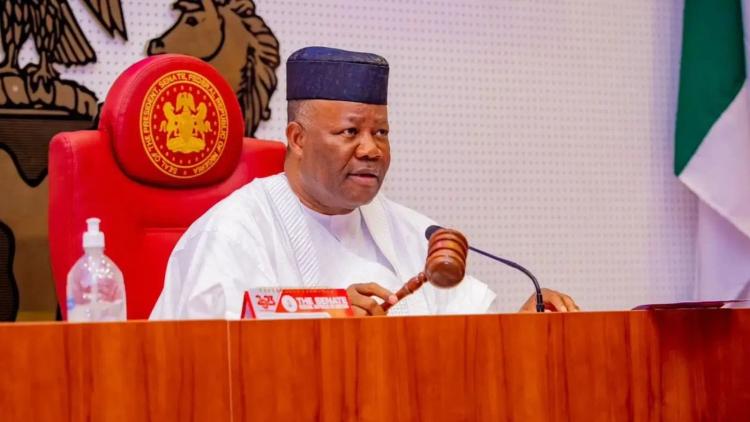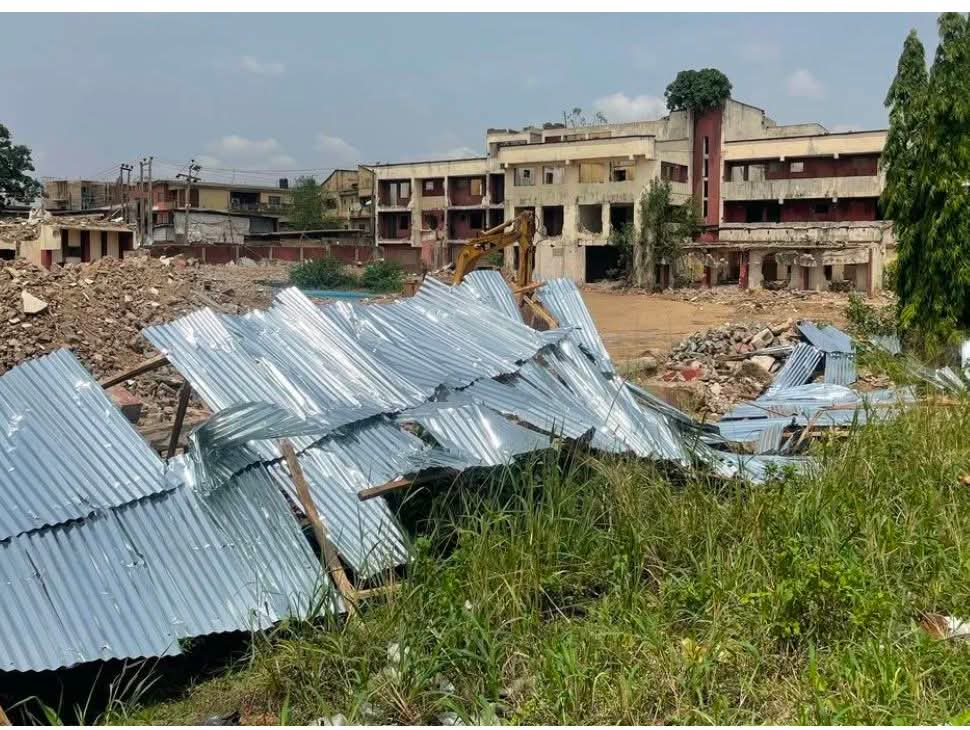“I did not mention it to you. The lady that was among the trio recently freed from the Kaduna train hostage attack is my sister-in-law. She was released after payment of (a huge) ransom…She spent about 80 days with the demons. Look at her picture again; you will see something very dead in her eyes.”
The person who sent the above message to me put a figure to the ransom paid and he said it was not in naira. I dare not mention the amount and the currency of transaction for fear of suffering what Trust TV suffered last week. This is a time to ‘face front’, close eyes and keep quiet. But I think it should be safe to add that the freed victim above is said to be the only sister of a popular Yoruba bishop. It should also not be dangerous to say that everybody in the family, the ones with means and those in poverty, pooled resources to raise the money with which they bought back their daughter. They had to; they are Yoruba among whom life is valued far above gold and diamond.
Banditry and terrorism in Nigeria are flying the ensign of business. We need to study who the barons are to effectively engage them. The moment politicians paid N100 million for nomination forms with uncommon ease, kidnappers took a cue and raised their ransom base to N100 million per captive. That is what you get when the very thick line between politics and criminality is cleaned out. Nothing works and nothing pays again in Nigeria apart from politics and kidnapping. And both appear involved in some romance which has deregulated criminality in Nigeria. Last week was like the weeks before it – horrific in details. Check yesterday’s papers and their headlines of blood: ‘6 policemen, 2 expatriates, 5 others killed in Imo, Kogi, Taraba attacks’; ‘Gunmen kidnap 4-year-old in Ekiti; ‘Bandits demand N100 million to free three abducted kids’…etc.
The miserable toad of this government has lost its way to the stream. The easy path for the lost to take is the unprofitable valley of punishment for the media for exposing the rump of a regime of terror. Trust Television got fined N5 million last week for reporting banditry five months ago in a documentary. That five million naira fine smells like a rogue regime competing with bandits (or complementing banditry) in taking its own ransom from the media. So, should caution be the buzzword now? Will that not be worse than surrendering to terrorism and its patrons? We no longer get adequate news and figures from the ‘finished’ states of Zamfara, Niger, Kaduna and Katsina. An iron curtain has been drawn over that vast ungoverned space by a government that covets a blind nation. But why? A doctor once said that seeing the end of patients’ lives is a significant part of her job. That appears to be the thinking of the doctors standing over Nigeria.
If truly our government has been negotiating with the abductors of the Kaduna train victims, why has it come out bloodied and defeated? A Vanguard newspaper report yesterday said government was unhappy that the terrorists reneged on a swap arrangement. The report quoted a government source as lamenting that “30 detained terrorists majorly comprising their children and pregnant spouse were released in exchange.” Government, it said, maintained that “the woman, who was delivered of twins, was well taken care of at the expense of government and handed over to her parents in Maiduguri, as part of the swap deal…But the first sign of deceit in the exchange bargain came when only eleven of the 63 kidnapped victims were released by the terrorists.” The lamentation included the fact that “while government was true to its bargain, the terrorists played a fast one by reneging on theirs…Instead, they have continued to release the victims in batches. The timelines showed that the managing director of the Bank of Agriculture was released on 6 April, a pregnant woman on May 15, 2022, seven others on July 10 and 5 on August 2, 2022…” At what point do you bargain with the enemy? True winners hardly negotiate with the other side; and when they do, they avoid what business experts call ‘winners’ curse’. That, perhaps, was why the terrorists ignored whatever deal they sealed with a government they increasingly see as no victor in this war.
Two years ago (December 22, 2020), the Financial Times, in an editorial, warned that Nigeria was at the risk of becoming a failed state. “The definition of a failed state is one where the government is no longer in control.” It said, and then warned: “By this yardstick, Africa’s most populous country is teetering on the brink.” Scholars Steven R. Ratner and Gerald B. Helman, who first used the term ‘failed state’ in 1993 describe clearly what they saw. A failed state, they say, is one that is “utterly incapable of sustaining itself as a member of the international community;” a state where “civil strife, government breakdown, and economic privation are creating more and more modern debellatios, the term used in describing the destroyed German state after World War II.” They add that a failed state is particularly one that has descended “into violence and anarchy—imperiling their own citizens and threatening their neighbours through refugee flows, political instability, and random warfare.” The disease of that state, they hold, includes massive abuse of human rights. They say, with very heavy heart, that it cannot be helped because its problems “tend to spread.”
We long for a home that cares but our country is terribly sick and we all know it. And the illness looks terminal, an end-stage disease that has progressively spread across all parts of the country. The symptoms are there, the usual complications are occurring. When we worry that government is helpless – or even absent – those conversant with what Nigeria suffers from speak of these times as the period from the end of active treatment to the time of the patient’s death. Medical science would have described today as end-of-life care period, or period of terminal care but the paid caregivers do not care; they are absent in diligence and competence. What has happened is much more than a crash. I pray I am exaggerating our situation.
Now, the one-million-dollar donation in Ibadan.
University of Ibadan’s College of Medicine did a fundraising event last week to build a hostel for its students. An alumnus of the college, Dr. Philip Ozuah, stunned the nation with a donation of $1million. Ozuah left Nigeria for the United States shortly after graduation in the 1980s. He landed in the US and had his flower in full bloom. If he had remained here, he would be a victim of Nigeria, perpetually broke, on strike, begging for his salary to be paid and having his children locked out of school. I saw photographs of students and staff at the event applauding Ozuah and his gesture. I could imagine what was going on in their minds. At least one of them there was Ozuah’s classmate. She is a success too. But when was the last time Nigeria paid her salary? Ozuah’s colleagues in that college and everywhere in Nigeria would be wondering what they were still doing in Nigeria. And the students? I would be shocked if what they saw had not strengthened their resolve to bail out of this floundering ship.
The one million-dollar donation to UI’s College of Medicine is how much in naira terms? That should be some N700 million. How much will that be tomorrow? The manipulators of our system will decide that. But it may become N1 billion or more by December unless God retrieves the balls of the naira from those squeezing the economy. A body at the point of death transits to a new life of bacteria, fungi and other parasites celebrating a haul of freebies. Nigeria is at that point. The vultures are busy on the corpse. Universities have been closed since February 14 – how many days ago? And those seeking your votes next year have thrown it at your face that they won’t kill themselves to satisfy the striking lecturers. So, if students are not in school, how is the college that produced Ozuah going to produce the next generation of pride of the nation?
Those in the cold abroad are homesick; the ones at home feel sick of the heat here. It is misfortune when you hear the Yoruba say Ilé ò gbàá, ònà ò gbàá (home rejects him and abroad won’t take him). The mass flight from the horror and terror of Nigeria is not stopping soon, especially with insecurity adding to the woes of deprivation. You read the report of the US-based Ogbomoso man who planted a hotel in his hometown and was kidnapped and murdered as soon as he stepped on the soil of Nigeria. That is the tragic flip side of patriotism, murder on the home front where one should be most safe. Yet, someone said “home is a place you grow up wanting to leave, and grow old wanting to get back to.”
Did Ozuah leave Nigeria in the mid-80s because he saw a nation with a pockmarked future? If that was the case, then the pox he saw has worsened a billion times. It is almost impossible now for the country to get well and be alright. Take a look at our leadership today and tomorrow; the recruitment process. Look at the line-up for the next political league. Does it not look like a perfect example of Alásedànù who hunts fish with dogs? How much does it take the country to train a doctor? How many of the trained has Nigeria encouraged to stay back? How many of those who stayed back have not regretted that decision? Eighteen years ago, seven scholars studied what they called the flight of physicians from West Africa. They noted that “in the year 1981, there were 202 physicians in the US who were trained originally in Nigeria or Ghana, but by 2002 that number had grown to 2,636—a 1,200% increase” (See ‘The flight of physicians from West Africa’ by Amy Hagopian et al. 2005). What is the current national figure for Nigeria? Two years ago, there were 74,543 doctors on the register of the Medical and Dental Council of Nigeria (MDCN). The figure will be around 80,000 now. Official figures say about half of these (40,000) have escaped from what Nigeria does to its assets.
My people say Ogbón dùn ún gbón, Ìmò dùn ún mò (wisdom is sweet to have, knowledge is pleasant to possess). That is what I told a virtual forum of Yoruba leaders and intellectuals on Saturday, July 30. The vehicle of success is wheeled by knowledge and education – and the wisdom to deploy them positively. No child achieves greatness by simply singing about it: mo fé lówó bí daddy mi (I want to be rich like my dad). No. It is true the successful have only one head like those on the opposite lane; the difference is in what each side used their head for. Those who may crave Ozuah’s success need to read his life: medical degree from the University of Ibadan; Master’s degree in education from the University of Southern California, Los Angeles; Ph.D. in educational leadership and administration from the University of Nebraska, Lincoln; postdoctoral fellowship in medical education at the University of Southern California School of Medicine, Los Angeles. And, you need to read how Ozuah is described by the organization he leads: “Dr. Ozuah is the President and CEO of Montefiore Medicine, the umbrella organization for the Albert Einstein College of Medicine, and Montefiore Health System’s 13-member hospitals, 300 ambulatory sites, and 7.5 million patient encounters per year. A nationally recognized physician, leader, executive, researcher, teacher and author, Dr. Ozuah leads an organization with 10,000 physicians and 53,000 employees serving a diverse group of patients…and with $8 billion in annual revenues…” You don’t look at the full-length trouser of the man of success; look at the length of his toil.





